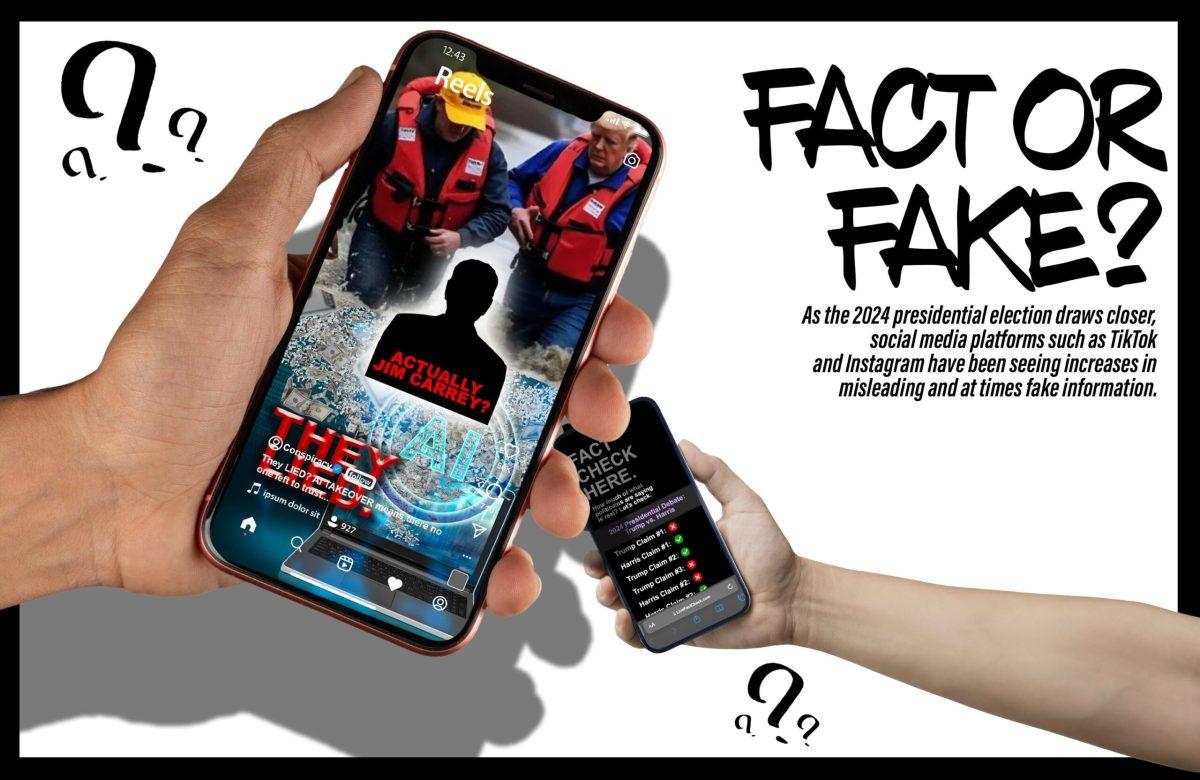As the 2024 presidential election drew closer, social media platforms such as TikTok and Instagram saw increases in misleading and fake information.

With less than a week remaining until the Nov. 5 presidential election, presidential candidates Vice President Kamala Harris and former President Donald Trump have been rapidly ramping up their campaigns.
Since the 2008 election, social media has been one of the most prominent ways candidates have been able to promote themselves. In the 2008 election, former President Barack Obama was widely regarded as the first presidential candidate to use social media as one of his main campaigning techniques.
This shift in the way we view modern campaigning resulted in Obama winning over 70% of the age 25 and under voter demographic, and revolutionized modern campaigning in the process. In the 2020 election, the top eight most popular candidates spent over 126 million dollars marketing on Facebook alone.
However, with such an emphasis being placed on campaigning via social media, a disturbing trend of influencers spreading political misinformation has emerged.
Many self-proclaimed political influencers have blurred the line between independent posting and campaigning due to social media’s allowance for short-form content to be pushed out at an extremely quick rate.
As a consumer, it can often be easy to watch a video, consume the information then move on without a second thought. These influencers use this to their advantage, whether it be purposefully or not. The issue arises when these influencers masquerade as independent from any political campaign when, in reality, they have a connection with a political party.
In recent months, John McEntee II has grown to be a prominent political figure who focuses his content on politics on TikTok. McEntee posts 10 second videos of him eating all kinds of food while making snide remarks about political figures or influencers he disagrees with.
McEntee was actually a member of the Trump administration’s 2016 and 2020 campaigns and is a senior advisor of ‘Project 2025’. With content creators not being forced to disclose if they have previous political experience, it blurs the line between genuine creators and propaganda.
Candidates attacking each other’s character is nothing out of the ordinary in modern U.S. elections. Some candidates garner a fear that their opponent has ulterior motives if they were to win office. This rhetoric creates a toxic cycle of people voting for the candidate they dislike less, instead of voting for which candidate they think is more qualified.
This fear-mongering was evident during the Sept. 10 presidential debate, and to a lesser extent the Oct. 1 vice presidential debate. To easily spread their messages, both the Trump and Harris campaigns have been rapidly pushing out short clips on social media of either their candidate in a positive light, or their opponent in a negative light.
Trump’s social media team “Team Trump” and Harris’ social media team “KamalaHQ” have been posting upwards of 3-5 videos per day on both their Instagram and TikTok accounts in the past few weeks.
With an average teenager/young adult spending roughly 1.5 hours on TikTok and nearly an hour on Instagram daily, it’s likely they’re exposed to some sort of political campaigning multiple times per day.
Since 2016, young voter turnout (18-29 demographic) has been rapidly increasing. As it’s likely most University of Missouri students are first time voters, emphasizing informative voting is important when voting for the first time.
Sites such as AllSides and Ground News allow for people interested in learning more about politics to read news articles that are filtered by how biased they are. Articles that are more left or right leaning are tagged by the site’s filters so readers know what type of media they’re consuming. Because knowing if the information you’re reading is biased, is the first step in being a responsible voter. Responsible voting is the key to being proud of the vote you’ll cast, and being proud of your vote is important because the fate of the country is quite literally in your hands.
Edited by Preston Smith | [email protected]
Copyedited by Maggie Atkinson and Hannah Taylor | [email protected]
Edited by Emily Skidmore | [email protected]